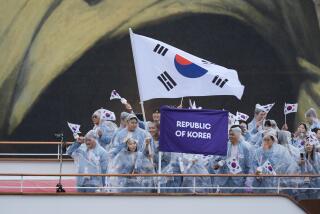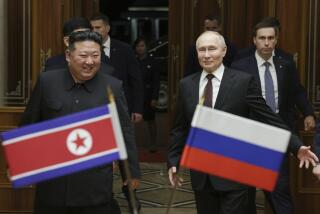North Korean ‘fans’ at World Cup look out of place
- Share via
Reporting from Johannesburg, South Africa — The North Koreans are back in the World Cup after a 44-year absence. But some may wonder why they bothered to come.
The Brazilians, who play in the tournament every four years, have more than 500 journalists following them here. The North Koreans, in only their second World Cup, brought two photographers, two TV reporters and one writer.
In the U.S., where soccer is still considered a minor sport, more than 136,000 World Cup tickets were sold. In North Korea, where the team is making history, the national soccer federation distributed 1,400 tickets.
In South Africa, a soccer game is a thinly disguised reason to sing, dance, scream and blow on a vuvuzela for hours. The North Korean fans handpicked to attend their country’s World Cup opener Tuesday displayed all the joy and spontaneity of accountants attending a seminar.
That the game — played in a wind chill of 24 degrees — ended in a 2-1 victory for Brazil was predictable. That several hundred North Korean fans were on hand to watch it was not.
China’s state-run news agency has reported that North Korea had offered tickets to sporting officials and tour agencies in China, which does not have a team here. Chinese journalists in South Africa had adopted the North Koreans as their own and, the news agency reported, about 1,000 Chinese dancers and musicians were recruited to cheer for the North Koreans.
But shortly before Tuesday’s game started, a five-row block of seats on the second level at Ellis Park Stadium filled up with more than 40 men and a woman, all dressed in identical red shirts, jackets and scarves, wearing identical red caps and waving small North Korean flags. Across the way there was another similarly sized red dot of fans in grandstands that were otherwise filled with the green and yellow of Brazil.
Kim Yong Chon, 43, one of the North Korean fans, said the group, which numbered 300, was not Chinese, but he admitted they had been carefully recruited by the North Korean government to make the trip. Speaking through an interpreter, he said the group had left Pyongyang, North Korea’s capital, and traveled through Beijing the same day and they would stay in South Africa as long as their team does.
They sang the North Korean national anthem loudly but sat passively, almost expressionless, through most of the game, with one man sucking on a beer. They spoke only infrequently to one another — Chon said they didn’t know one another before coming to South Africa — and mainly reacted to the action on the field only when directed to do so by a man who stood before them like an orchestra conductor.
Few of the men bothered to acknowledge the non-Korean fans, following the lead of their team, which was hidden on a private floor of a luxury hotel, failed to show at news conferences and banned outside journalists from its training sessions.
FIFA has chosen not to challenge the team over media availability, so after Tuesday’s game, while members of the Brazilian team spoke at length with reporters, most of the North Korean players brushed by. Only a handful bothered to stop at all, most notably star striker Jong Tae Se, who cried during the playing of his country’s national anthem. And he was quickly shooed along by members of the North Korean delegation.
Perhaps all this would have gone unnoticed had North Korea opened against another team that plays a staid, defensive game. But against the passionate Brazilians and their samba-dancing fans, the contrast was stark.
But Chon at least tried to acknowledge the tenets of international friendship and cultural exchange events such as the World Cup are supposed to engender.
“We will also be supporting South Korea,” he said, mentioning the country that North Korean Coach Kim Jong Hun had refused to acknowledge a day earlier. “Our hearts are with them too.
“But we have no tickets for any of their games.”
More to Read
Go beyond the scoreboard
Get the latest on L.A.'s teams in the daily Sports Report newsletter.
You may occasionally receive promotional content from the Los Angeles Times.







